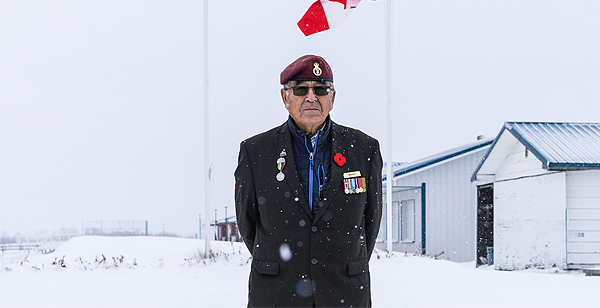Cold War veteran his story of his journey
- Liam O’Connor | December 12, 2022
Like many of his generation, Emile Highway, an 80-year-old veteran from Reindeer Lake, Manitoba, was taken by the Residential School System as a child.
He attended the Guy Hill Indian Residential School for almost eight years, then in Grade 8 he said students were kicked out so they couldn’t receive any level of higher education.
Highway said that his time there was extremely traumatic and, after eight years, he didn’t walk away from the school with a competent level of education to prepare him for the world.
“We’re going to keep kicking your people out at Grade 8, so they can’t progress economically, socially [or] politically. And you’re gonna be where you are, you’re stuck,” said Highway, describing the sentiment of the government at the time.
Determined to learn and make something of himself despite the roadblocks placed in his way, Highway decided the Canadian military would be his best route to higher education.
“I was smart enough to realize that I needed some kind of a trade in order to make a living as I reached adulthood.”
Highway applied to the Royal Canadian Electrical Mechanical Engineers (RCEME), a program for mechanical positions embedded with the infantry division where he could fix cars, trucks, tanks and artillery.
However, Highway said he was refused because he didn’t have the education qualifications.
He went back to school, got the qualifications and reapplied — this time he was accepted into the military, but they told him the RCEME program was full, but they needed men in infantry — and Highway obliged them.
“(Residential Schools) made us susceptible or readily affected, to being recruited or voluntarily enlisted into the army,” said Highway. “And that’s what happened to a lot of us who went to Residential School. I met veterans overseas who had been through the same process, so it was deliberate.”
Highway recalled a time when he and other Indigenous veterans chatted about why Indigenous people fought for “the white man’s army,” and he said they all came to the conclusion that they did it for the land and treaties.
After training, Highway was sent off to West Germany during the Cold War in November 1963.
He remembers being shipped off to West Germany at this time vividly because it was shortly after the assassination of United States President, John F. Kennedy.
His job while in West Germany was to keep the Russians out of Europe.
While the architecture, food and language were eye-opening for Highway, he said he looks back on that time and thinks about how the term “never again” was coined and used around the world because of the Holocaust, but there continue to be many atrocities and inhumanities to this day.
“There have been so many tragedies similar but not equal to the Holocaust over the years, that this ‘never again’ is absolutely meaningless.”
“Like Rwanda and Cambodia, Biafra, Darfur and Bosnia.”
Highway went on to do a peace mission in Cyprus and eventually ended up back in Canada.
Never giving up on getting a higher education and achieving the trade he initially had his sights set on, Highway applied to a military engineering program, where he finally was able to upgrade his education and work at a power plant in B.C.
“All I had was a blanket, I mean a (piece of) cardboard for a blanket, you know, and I never thought I’d own a home, no, never in my wildest dreams did I ever think I would own my own house. I bought an old house, renovated it, hired contractors to put in a new kitchen and stuff like that. I’m sitting in it right now.”

